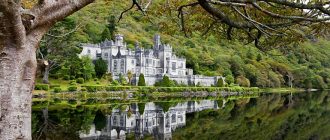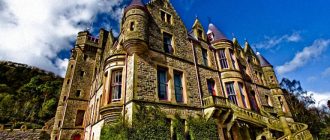As I motored into Garnish on October 6th the Harrington brothers came out in their fishing boat and at first could not understand my questions about the depth of the water in the cove. However, as they came alongside and saw the rather battered yacht with the guardrails gone and my scruffy appearance with a beard, they soon realized I was a stranger to their waters. Twenty minutes later I was ashore enjoying an Irish tea with Mrs O’Sullivan, who keeps a tiny store. She had a telephone and I was able to speak to my old friend Commander Bob Eborall at Castletownshend, sixty miles away, for fifteen minutes; it cost three pence!
As I returned to Dawn Star reaction began to set in, and James Sullivan, the local schoolmaster, came back with me to cook my evening meal of fresh mackerel. At 22:00 the Press reporters arrived for half an hour before they left me to clean up the shambles both below and on deck until after midnight. I had to ditch some blankets which had become rotten and mildewy, some stinking food, and the last of the rancid butter and of course my old clothes, which I had not taken off for the last fortnight.
After the Press interview in the morning Bob and Maggie Eborall arrived and after seeing the yacht they took me back with them to the nice old village of Castletownshend near Skibbereen for two days’ rest at their home. The rest was really a wonderful change, but I still lacked the sleeping time.
On October 10th Maggie drove us back through Bantry to Garnish, and Bob and I worked hard to make Dawn Star a little more shipshape. I sewed sails while he set up the slack rigging and resecured the broken lamps. We removed the oil and soot from the deckhead, but though I got the engine running I could not repair the leaky petrol tank.
The next morning we hoisted the dinghy and motored out of this tiny place, with its few inhabitants living almost at the end of Europe; going through Dursey Sound we made sail and set a course for Mizen Head. The south-west wind was favourable and sped us past the Fastnet Rock, outside of Cape Clear, and we entered Baltimore as darkness fell at 19:30.
For the next five days Willie Skinner, who has a boatyard there, worked at the most immediate repairs and the renewal of the toe-rails, while the yacht lay alongside the wall in Baltimore harbour. My sister and brother-in-law flew over from England and helped me to rectify the many minor defects. It blew a gale for the first two days and within a few hours the bow warp had parted owing to chafe on the edge of the quay.
I enjoyed many a beer in Denny Salter’s pub, little realizing at the time how many more I would have there.
On October 17th I sailed out of Baltimore harbour with the storm foresail set and ten rolls in the mainsail, clearing Baltimore beacon at 11:30. Half an hour later, with many rips and much flogging, the mainsail blew out to shreds, and I ran back into harbour under the foresail; while I set to sewing together fifty feet of torn terylene I assessed the position. The further I sewed, the more apparent did it become that this mainsail would never take Dawn Star back to Chatham; ten feet of the head was so paper-thin that the colour of the sky could be seen through it!
Brigadier and Mrs Foley, who live in Baltimore, realized my predicament, and offered me an apartment for the winter, so the next day I arranged with Willie Skinner for Dawn Star to be hauled, and after taking the mast out she spent the next five months sitting on the car park.
I settled in to spend the winter ashore and will always be grateful for the facilities given me by the Foleys and everyone else in Baltimore and Skibbereen.
I did not know it at the time, but Sadlers at Burnham-on-Crouch had already started work on a new mainsail, which they completed within ten days; however, the die was cast and I had made my arrangements to refit the yacht in Ireland.
While the objective was to repair Dawn Star, I did enjoy the break from sea routine, and a steady horizon occasionally swayed in Denny Salter’s establishment. Every week I dined with Aileen Foy in her rambling old Castle House, the plaster ceilings falling on the rotting floors; even today lighting is by kerosene lamps, and with the light of the flames flickering on the walls as the winter gales howled round us, the building had a history to tell.
We were having tea one evening when I heard the first unmistakable rocket bang off; followed by more, I ran to the lifeboat house, and five minutes later I joined the crew, donning a cumbersome life jacket, an article which I had never worn before. We launched and motored down harbour at full speed. The operation was a comparatively simple one: to find a Spanish trawler and bring an injured seaman ashore. Not knowing his injuries, we were well insured for any eventuality, for I found both a doctor and the parish priest keeping warm in the engine room!
After embarking the seaman in the lee of Cape Clear island we returned to Baltimore, and found that the Spanish agent had arrived from Bantry and invited us all to drink for the evening at the expense of his government.
I stripped out Dawn Star and began work. When it rained I went over the vast amount of equipment, renewing whippings, sewing sails, and generally refurbishing. I was rather aghast at the wreck of everything that was left and I had quite forgotten what I had ditched in the Atlantic in the way of clothes and gear; new handkerchiefs, I knew, had been used to shovel up the slobber of porridge and fragments of broken glass, for I was not then in any position to count the cost. It took three days to scrub out the saloon, and then I could re-varnish her lovely mahogany interior. In the early spring I painted her topsides to cover over the scars of the long voyage; it had not been done since Grenada. New deck stanchions were manufactured, and I stripped the engine for a complete overhaul; the petrol tank had to be renewed, for it had rusted through in several places. When it came to renewing the rigging I found that all the bolts through the mast had been bent to bows, crippling the wood; at last the reason for the slack rigging after the knockdowns was apparent; the wire shrouds had held but the bolts had not.
On March 13th, Dawn Star re-entered her proper element, and after the mast had been stepped by the Cape Clear mailboat I fitted her out, lying to a mooring off the mortuary in the cove. Through the dusty cobweb-shrouded windows of this old building I could see a remarkable carriage; inquiries revealed that it was the old horse-driven, or, being Ireland, donkey-driven, rocket life-saving apparatus. Though to a design probably fifty years old or more, it was maintained in perfect condition, with the hundreds of fathoms of grass and manila rope neatly coiled ready for running, and the old lamps and brasswork faithfully polished. It well suited the rough tracks and terrain in the neighbourhood.
Before I left Baltimore I gave a talk about the voyage to the local folk, and the sailing club honoured me with Honorary Life Membership; this took my sails completely aback just before I had to speak.
On the morning of March 22nd I made my farewells to these kind Irish people, and slipped the mooring at 12:10, catching the tide to the east to enter Castletownshend at 14:40.
For four days it sleeted and hailed; ashore people took turns at feeding me while I kept an open bar aboard.
Regretfully I sailed out of the harbour on March 27th, past Brigadier Beecher’s house with its thousands of spring daffodils reaching down to the water.
A Force 7 westerly wind sped me to the south-east, but I had to lie a-hull for two hours when I had sailed clear of the land, and only later was able to hoist the storm foresail. I secured for the night at 22:00, quite unable to take the bitter cold on deck a moment longer; a shakedown cruise and back to the North Atlantic routine in one!
I had no radio, but before I departed I had heard about a tanker, the Torrey Canyon, which had gone aground on the Seven Stones reef, and that oil was spewing out to cover a vast area of the English Channel approaches.
With memories of Funchal and Las Palmas, and thoughts of my newly painted ship, I headed more to the south to round the Scilly Isles instead of Land’s End as I had originally intended. The thunderous distant rumbling and pall of smoke rising in the afternoon haze on March 29th as the Torrey Canyon was bombed, gave me a free bearing which confirmed my sun sights, and after a night lying a-hull twelve miles south of the Wolf Rock with the hail rattling down on deck, I rounded the Lizard, sailing through acres of oily sea and vast areas of coagulated muck.
My first port in England was the Relford River; only my papers convinced the customs officers of my voyage.
Securing from sea, I cleaned the ghastly oil from the ship’s side and went ashore; finding the cost of living in Britain was up to 50s. 6d. a bottle, I wondered how long I could afford to stay.
Sailing early on April 3rd, with a north-north-west Force 3 wind, I quickly cleared the Relford River; the landmarks of the Dodman and Rame Head drew abeam, and as I entered the River Yealm I thought how it reminded me of the entrance to English Harbour, despite the cold.
Two days later I went round to Salcombe to make my way up this lovely estuary behind Bolt Head. At the Island Cruising Club I met Judy Russell, whom I had last seen in L’ Abervrac’h skippering Hoshi. Round the Start, Dawn Star plugged the tide against the Force 6 north-east wind, bashing into the seas in Start Bay and east towards Berry Head, before entering Brixham.
It was here that the ‘Dream’ was born when I sailed aboard the first Dawn Star in 1936. A social round began with Jim Coates, the Potters, and my friends of those boyhood days in these waters, the Earl and Countess of Orkney; I was particularly glad to see old Charlie Bedford, a trawlerman who taught me seamanship long before I ever sailed under the White Ensign.
Waiting for the right wind, I made Totland Bay, Isle of Wight, in just under eighteen hours, being lucky to carry my tide; then I entered Yarmouth harbour on a Sunday to be met by friends and the Press reporters.
On April 22nd I made up the Solent to Newtown, now desolate but once the capital of the Isle of Wight and sending two Members to Parliament. I rowed up to Shalfleet Quay for a walk to the New Inn in the attractive old village.
Pausing for only one night at Gosport, I made the passage to Dungeness in fair weather; there a contrary tide made it necessary to anchor in the East Roads.
The passage round the South Foreland and up through the Downs under one genoa was fast, and I anchored for sleep off Queenborough before sailing up the Medway to pick up a mooring off the Medway Yacht Club for a warm welcome by the officers.
On May 4th I motored up to Thunderbolt Pier in Chatham Dockyard, which I had left just two years previously, and secured alongside at the end of a round voyage of 12, 704 miles.





